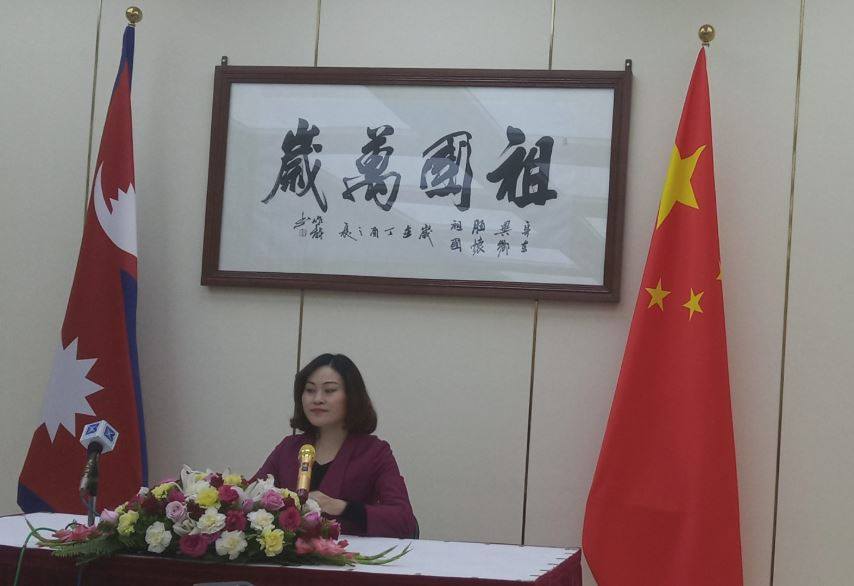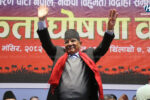KATHMANDU: The Chinese Embassy in Nepal has made public its stance on the widely-talked Millennium Challenge Corporation (MCC) Compact saying that Nepal should decide on its own.
Speaking at a press conference organized by the Chinese Embassy in Kathmandu on Friday, Hou Yanqi, the Chinese Ambassador to Nepal said that China does not interfere who should and can accept the grant from whom.
“We don’t adhere to the doctrine that Nepal should take aid or grants from China alone,” the ambassador told to journalists, “while accepting the international aid or grants, instead of deciding under influence, Nepal should decide considering its national interest.”
In a question related to the arrest of Chinese nationals in the capital, she clarified that they were the people arrested by Nepal Police for being involved in non-tourist activities. “They are in custody in Nepal,” the ambassador said.
Expressing Chinese notion on the concept of tripartite cooperation, she stated, “Two plus one does not mean Nepal is to be dictated by China and India as all countries are sovereign. This is a concept of enhancing cooperation between the 3 countries.”
She also said as a similar pact between India, China and Afghanistan, a joint-military training was going on in Afghanistan.
Full text of speech delivered by the envoy
Good morning and nice to meet you all! First of all, I would like to say Happy New Year and wish you all the best with your health, work and family!
Last year, you all positively reported on the China-Nepal relations and cooperation, gave high praise on the development of China and made important contributions to the healthy development of bilateral relations in your respective media. I would like to express my high appreciation and sincere thanks to you all!
In 2019, China-Nepal relations have blossomed in an all-round way. Bilateral relations have achieved rapid development in the fields of politics, economy, trade and people-to-people exchange.
First, I would like to provide you with a set of data. According to statistics, in the 2018/19 fiscal year China’s investment flow in Nepal was 114 million US dollars, making it the largest investor in Nepal for four consecutive fiscal years.
In the first 10 months of 2019, the trade volume between China and Nepal reached 1.2 billion US dollars, an increase of 36.1% year-on-year, of which Nepal’s export to China increased by 58.1%.
Chinese enterprises are still the main force in the projects contracting market of Nepal and they have taken the contracts of the rehabilitation of the runway and taxiway of Tribhuvan International Airport and the construction of Gautam Buddha International Airport.
According to the data from Nepal, nearly 135,000 Chinese tourists came to Nepal in the first 10 months of 2019, with a year-on-year increase of 11.5%.
The outstanding highlight of China-Nepal relations this year is the exchange of visits between the two heads of state.
At the end of last April, President Bhandari paid a state visit to China and attended the Second Belt and Road Forum for International Cooperation, becoming the first president paying a formal visit to China. President Xi Jinping’s state visit to Nepal in mid-October is the first time of the Chinese President’s visit to Nepal in the last 23 years.
During this visit, the two leaders have witnessed the signing of 20 cooperation documents concerning various areas of the national interest and people’s livelihood, announced the establishment of China-Nepal strategic partnership of cooperation featuring ever-lasting friendship for development and prosperity, agreed to align the joint building of the Belt and Road Initiative by China and Nepal with Nepal’s national development strategy of transforming itself into a land-linked country and to accelerate the building of the Trans-Himalayan Multi-Dimensional Connectivity Network.
At present, China and Nepal are stepping up to implement the important consensus reached by the state leaders, and some projects have also made positive progress. On the cross-border railway, the fifth meeting between China and Nepal on enhancing cooperation in railway sector was held in Kathmandu on November 2019 and the two sides reached a consensus on the three stages of feasibility study and the division of responsibilities between China and Nepal.
On the two roads connecting us, the Chinese side is assisting Department of Roads of Nepal in preparing the plan for the third phase of opening maintenance project of the Araniko Highway, and urging Nepal to complete the demolition work of Syaphrubesi-Rasuwagadhi Highway as soon as possible.
On aviation, Himalayan Airlines has opened direct routes from Kathmandu to Beijing, Changsha and Guiyang. With more than half of its main building finished, the project of Pokhara International Airport is progressing smoothly and is expected to be completed on schedule.
Regarding the 25 post-disaster reconstruction projects concerning people’s livelihood of Nepal, we have completed 10 projects including the first phase of Kathmandu Ring Road Improvement and Earthquake Monitoring Network Project. In near future, we will also have several new projects completed, approved or commenced. China is willing to work with Nepal to implement the agreements and consensus reached between the two countries.
Dear friends, last year was the 70th anniversary of the founding of the People’s Republic of China. Over the past 70 years, the Communist Party of China has united and led people of all nationalities throughout the country to realize the leapfrog development of China’s economy and society.
In 2018, China’s total GDP has reached 13.6 trillion US dollars, making it the world’s second largest economy. The operating-mileage of China’s railways has reached 131,000 kilometers, of which high-speed railways reached 29,000 kilometers, accounting for more than 60% of the world’s total high-speed railways.
The mileage of highway has reached 4.85 million kilometers, of which highways reached 143,000 kilometers. Since the founding of New China, about 700 million people have been lifted out of poverty. The employment, education and medical conditions as well as the sense of gaining, happiness, and security of Chinese people has been improved continuously.
On October 2019, the 19th Central Committee of the Communist Party of China held its fourth plenary session in Beijing.
The session emphasized on some major issues concerning how to uphold and improve the system of socialism with Chinese characteristics and advance the modernization of China’s system and capacity for governance, which included important aspects such as adhering to the vision of making development people-centered, and continuously guaranteeing and improving people’s livelihoods and improving people’s well being to achieve common prosperity for everyone, adhering to the unity of independence and self-reliance and opening up to the rest of the world and so on.
The annual Central Economic Work Conference was held in Beijing last month. The conference confirmed to ensure the achievement of poverty alleviation goal, to solidly promote the joint construction of the Initiative of “Belt and Road”, to strengthen pollution prevention and ecological construction and to improve people’s livelihood.
The two important conferences have made plans for China’s future development in all fields like politics, economy and people’s livelihood based on China’s national conditions.
As a Chinese saying goes, “One will never know whether the shoes fit his feet until he wears them.” Only the people in the country know if its system is suitable for its own conditions. The development achievement of the past 70 years have fully proved that the socialist system is the one most suitable to China’s national conditions.
We believe that China will realize the great rejuvenation of the Chinese nation through the socialist system under the leadership of the Communist Party of China.
China’s development has never been self-serving but linked itself closely with the prosperity and progress of countries around the world through mutually beneficial and win-win cooperation.
In 2018, China’s total volume of trade in goods was 4.6 trillion US dollars and trade in services was 791.9 billion US dollars, ranking first and second in the world. China utilized foreign capital of 135 billion US dollars and its investment to foreign countries and regions reached 120.5 billion US dollars, both ranking second in the world.
China’s contribution to the global economic growth has been more than 30% for many consecutive years, ranking first in the world and China has always played a significant role as a stabilizer and ballast for the global economic growth.
The “Belt and Road” Initiative, raised by China, has received positive responses from more than 160 countries and international organizations, allowing the world to share China’s development dividends and bringing more opportunities to the world.
In November last year, China successfully hosted the Second International Import Expo, which attracted 155 countries and regions including Nepal, and 26 international organizations. The exhibition area reached 360,000 square meters.
The Expo was founded by China, but for the world to share. It will turn internal market of China into a huge global market and into a valuable opportunity for the globe.
After 13 rounds of negotiations, China and the United States have agreed on the text of a phrase-one economic and trade agreement based on the principle of equality and mutual respect, which will not only serve the fundamental interests of the people of the two countries and the world, but also is expected to have positive impact on the world economy in the areas pf trade, investment and financial market.
As President Xi pointed out, “Only when the world is good, will China be good. Only when China is good, can the world get better.”
However, some western countries don’t want to see a prosperous China, and they are criticizing China on issues related to Hong Kong and Xinjiang. Recently, the continuing violent crimes in Hong Kong have challenged the bottom line of the “one country, two systems” principle, and have pushed the city to an extremely dangerous situation.
Now, the government of HKSAR has taken measures to contain the spread of violent incidents. All Hong Kong-loving and patriotic people with a sense of justice have stood together against violence to safeguard rule of law in Hong Kong. The current problem in Hong Kong is by no means the issue of freedom and democracy, but whether to stick to the rule of law, the legal expression of appeals, and the punishment of crimes according to law.
Xinjiang has suffered a lot from terrorism from the 1990s to 2016. Domestic and overseas separatist, extremist and terrorist forces had planned and made thousands of violent terrorist incidents, which had caused great losses to the lives and property of people of all ethnic groups in Xinjiang.
In recent years, the Chinese government has adopted a series of measures to combat violent terrorism and maintain social security.
The effects have been remarkable and no violent terrorist case has occurred in Xinjiang during the past three years. The public security situation has clearly improved, and people of all ethnic groups in Xinjiang live and work in peace.
The Xinjiang local government also draws on the experience of some Islamic countries and establishes the vocational skills education and training centers in accordance with the law, and arranges people affected by extremism ideas to learn Chinese’s common language, laws and skills there in order to get rid of the erosion of terrorist ideas and return to normal life.
However, the western countries have reversed the black and white and lorded over China’s internal affairs with double standards. They went as far as framing the sabotage activities of Hong Kong violent people as “a beautiful landscape” and describing the vocational skills education and training training centers as “concentration camps” for millions of Muslims. The Nepali government and people always adhere to the one-China policy which China highly appreciates.
We hope that our Nepali friends can know better the nature of the incident, work with us to resist and oppose any words and deeds that interfere in Hong Kong and Xinjiang affairs, defend the basic norms of international relations, including non-interference in internal affairs, and safeguard the common interests of developing countries.
Dear friends, now we are welcoming the year of 2020. I hope that in the new year, China and Nepal can join hands and support each other, achieve mutual benefit and win-win results, and create a better life for the people of both countries!
Also, I’m looking forward to working closely with all the media friends to give more positive coverage on China-Nepal cooperation and introduce more about China to the Nepali people!
Thank you very much!









Comment